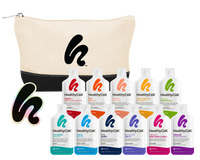What is high blood pressure?
High blood pressure, commonly referred to as "hypertension," is when the body's arteries exert excessive force against the artery walls, leading to several significant health problems.
About half of all people in the U.S. have high blood pressure, which can increase the risk of heart attack, stroke, kidney disease, and eye problems. However, many people don't even know they have it. How can you determine if you have high blood pressure? Your doctor or healthcare professional can tell you during a routine visit.
Several blood pressure ranges exist:
- Less than 120/80 mmHg- Normal.
- 120/80 to 129/80 mmHg- Elevated.
- 130-139/80-89 mmHg- Stage 1 Hypertension.
- 140 or higher/90 or higher mmHg- Stage 2 Hypertension.
- Higher than 180/ Higher than 120 mmHg or higher- Hypertensive Emergency. Call your doctor immediately.
Uncontrolled high blood pressure can result in renal failure, atrial fibrillation, heart failure, heart attack, stroke, and other serious health problems.
Symptoms of very high blood pressure include:
- Headaches
- Dizziness
- Breathing difficulty
- Mental haziness
- Chest pain
- Anxiety
- Chest discomfort
- Nausea & vomiting
Does COVID-19 contribute to high blood pressure?
More research is needed to better understand the relationship between COVID-19 and hypertension. However, some evidence suggests there could be an association between the two.
One hypothesis is that COVID-19 might lead to inflammation and clotting in the blood vessels as well as other parts of the body. The arteries may become damaged and less flexible due to this inflammation, causing a rise in blood pressure. It is well known that inflammation is associated with cardiovascular diseases, so it's essential to follow a low-inflammation lifestyle, especially as we age. For more information about lowering inflammation, check out: 7 Ways to Lower Inflammation In Your Body Fast.
Another theory is that COVID-19 may impact the body's renin-angiotensin-aldosterone system (RAAS). According to some research, COVID-19 may interfere with this mechanism, which is essential for controlling blood pressure.
Remember that these are theories and additional research is required. While it's important for healthcare providers to carefully manage the blood pressure of COVID-19 patients due to the potential severity of both of these conditions, it's worth noting that getting diagnosed with high blood pressure while having COVID-19 does not mean the two are connected. As more research emerges, we will better understand the relationship between COVID-19 and high blood pressure.
Can hypertension be treated or prevented?
Yes. The two main methods for lowering high blood pressure are lifestyle modifications and medication.
You can reduce your blood pressure readings by up to 10% simply by making a few lifestyle adjustments. Reducing systolic blood pressure, as little as 3 to 5 mmHg, can decrease your risk of developing heart attacks and strokes. Even minor improvements can significantly impact cardiovascular health.
Five methods to lower blood pressure:
- Consume whole foods: Increase your intake of fruits, vegetables, whole grains, seafood, nuts, and legumes. Limit your consumption of processed foods. Many of these contain high amounts of sodium, which increases blood pressure. By following the DASH Diet, you can reduce your blood pressure and lose weight. In fact, it’s possible to lower your blood pressure significantly in just 4 weeks by following a 10-step plan. For more information, check out Blood Pressure Down: The 10-Step Plan to Lower Your Blood Pressure in 4 Weeks - Without Prescription Drugs.
- Exercise: Physical activity keeps the blood moving and makes the heart stronger. As the heart becomes stronger, it becomes more efficient at pumping larger volumes of blood with less effort, causing a decrease in blood pressure. Attempt to exercise for at least 30 minutes five days a week. Check out 9 Ways to Improve Heart and Cardiovascular Health Naturally for more tips.
- Less stress: Continuous stress can harm the arterial walls. Under stress, the body releases a flood of hormones, which can cause the blood vessels to narrow. To reduce stress, practice self-care techniques, including deep breathing exercises, yoga, long walks, meditation, and counseling. Learn about restorative health benefits and practice these healthy habits each day. You may also consider taking an Ashwagandha supplement. Some natural herbs have been shown to help reduce feelings of anxiety and stress, including Lemon Balm and Ashwagandha. Lemon balm can be found in over-the-counter sleep supplements, such as Healthycell's REM Sleep, because it helps the body relax during the first stage of sleep.
- Stop smoking: Smoking increases arterial plaque formation by thickening the blood and raising blood pressure. When you quit smoking, your risk of having a stroke decreases right away. Check out Allen Carr's Easy Way to Stop Smoking for helpful tips.
- Keep a healthy weight: Obesity is one of the top causes of high blood pressure. Being overweight puts strain on your heart, kidneys, and other organs in the body. Even weight loss of 10-pounds can significantly impact your blood pressure. If you embark on a weight loss journey, be sure to include the 4 Best Vitamins and Minerals for Weight Loss in your diet.
- Choose the right supplements: Choose supplements that can help promote healthy blood pressure and cholesterol. Healthycell's Heart & Vascular Health contains a blend of clinically proven plant extracts, vitamins, and minerals designed to maintain healthy blood pressure, cholesterol, and triglyceride levels.
You might also need to take medicine to control your blood pressure. You and your doctor should decide if this is the proper treatment for you.
About the Author
Dr. Giampapa is a world-renowned medical doctor, inventor, and surgeon specializing in anti-aging medicine. He recently received a nomination for the Nobel Prize for his groundbreaking stem cell research, as well as the Edison Award for the Healthycell nutritional supplement for cell health. He was also awarded the A4M Science & Technology award for his development of the BioMarker Matrix Profile – the first computer program to measure aging. Learn more about Dr. Vincent Giampapa.




